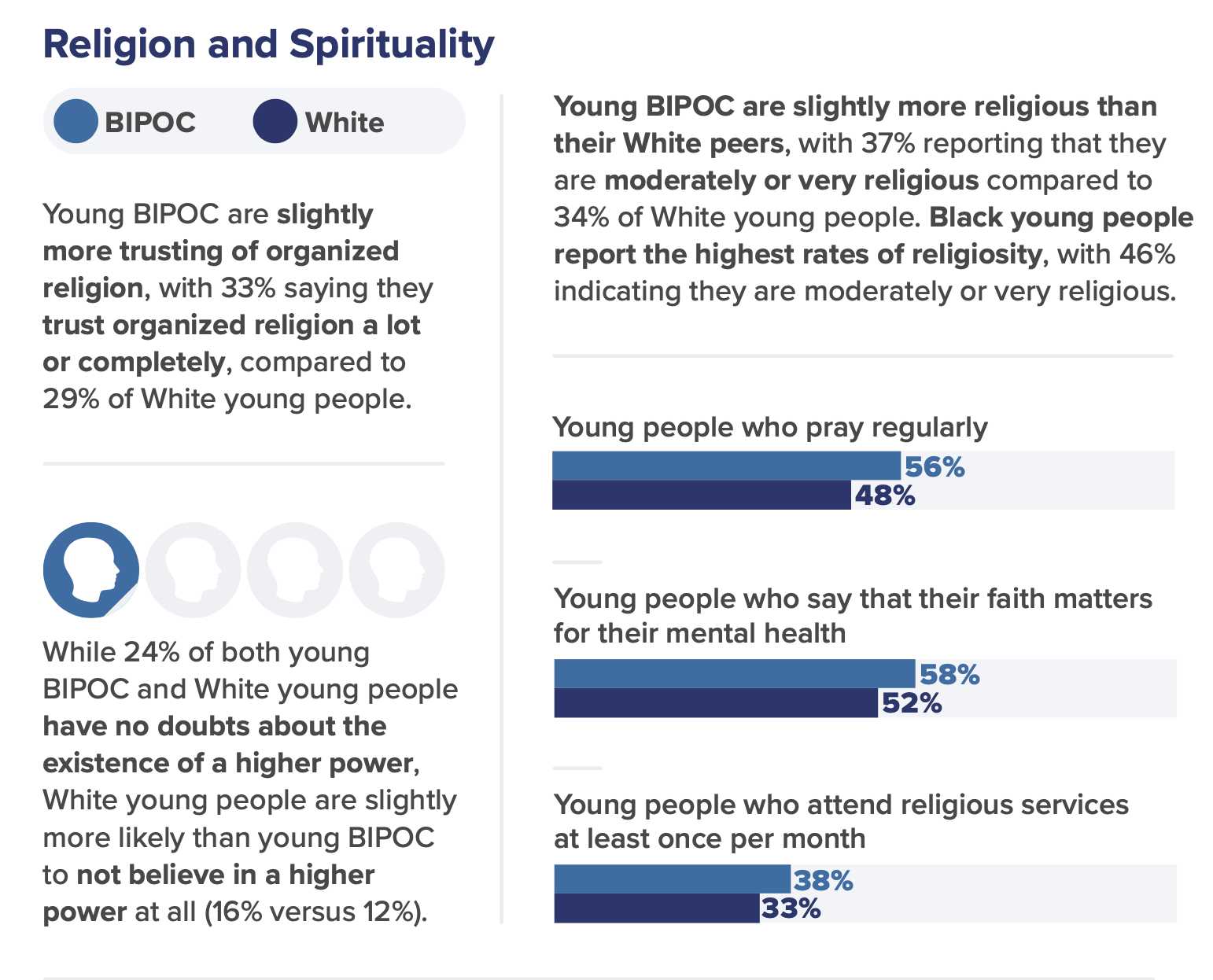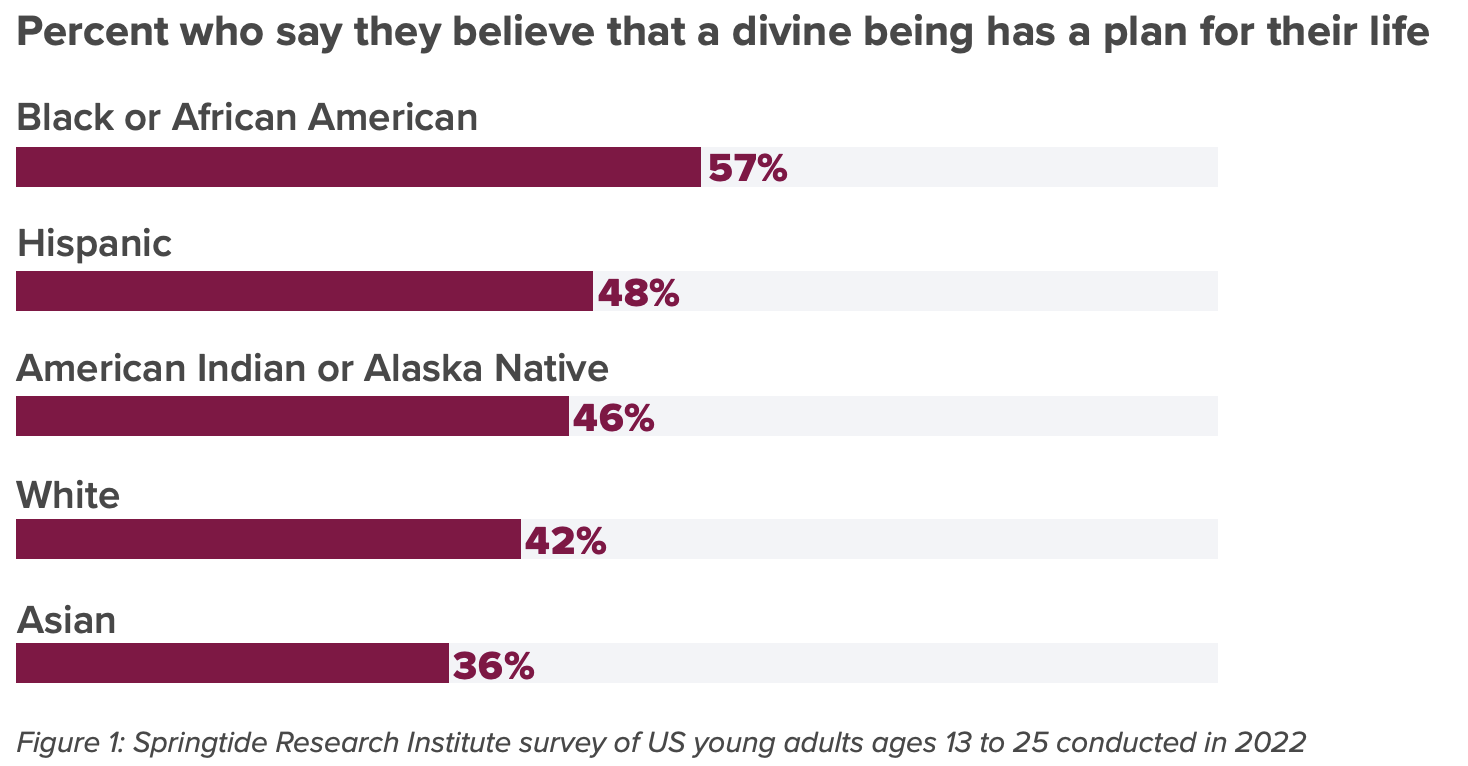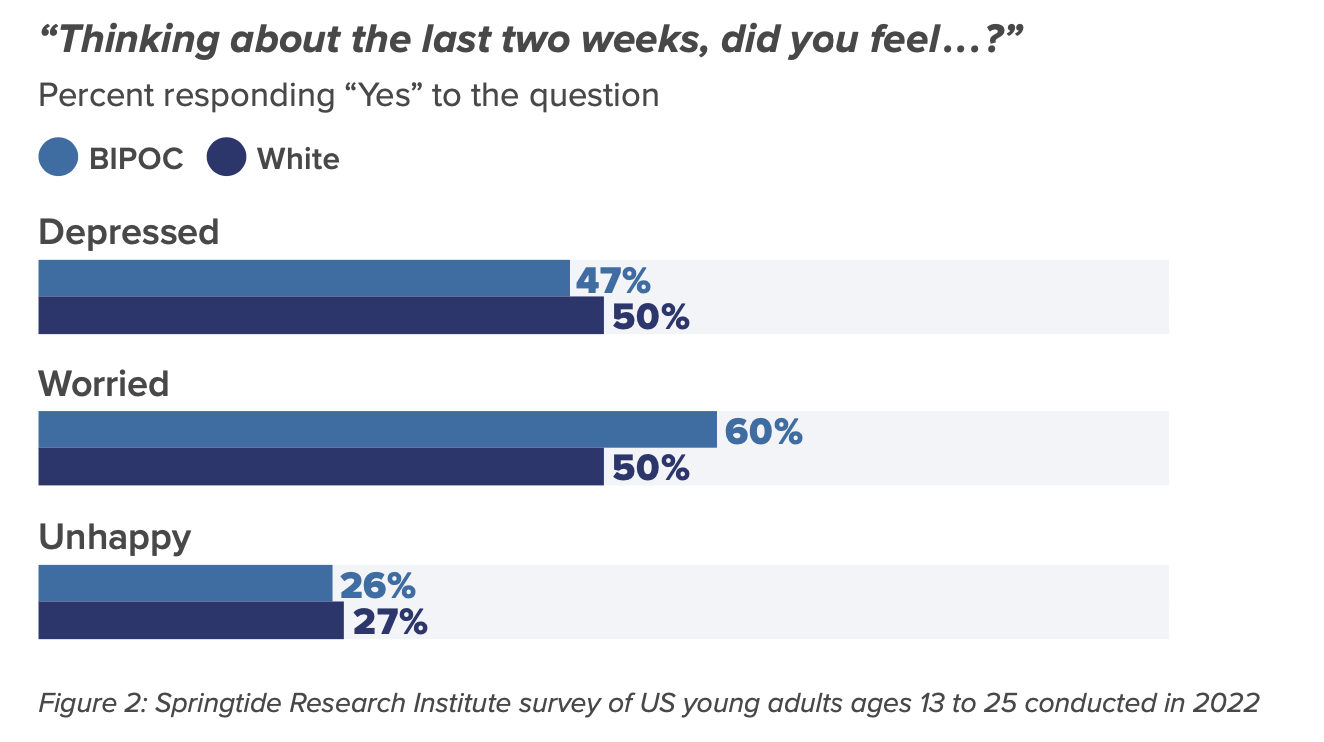Young Americans of color are slightly more religious and enjoy better mental health than their white Generation Z counterparts, according to a new study by Springtide Research Institute.
These findings were quantified in spite of the intense racial prejudice and social injustices faced by Black, indigenous and people of color, or BIPOC in the study’s terminology. “Research in psychology shows that these experiences are associated with elevated levels of trauma symptoms, depression, anxiety and suicidality,” Springtide said in “Navigating Injustice: A Closer Look at Race, Faith and Mental Health,” released Feb. 7.
“Despite these experiences, Springtide data reveal young BIPOC are flourishing mentally and emotionally at rates comparable to their white peers. Further, young BIPOC report high levels of life satisfaction, agency and self-esteem.”

The current study draws on previous studies Springtide conducted in 2021 and 2022 and represents a sample of 5,951 young people, of which 3,159 were people of color.
The survey noted its findings come at a time when Americans in the 13 to 25 age bracket, also known as Gen Z, have reported soaring levels of mental and emotional illness overall. Last year, 47% of young people told Springtide researchers they were moderately or extremely depressed, while 55% said they were moderately or extremely stressed. And 45% said they experienced those levels of loneliness.
But when young people of color were asked what helps them through these trying times, more than half (58%) identified faith as a key ally. And they did so at higher rates than others, Springtide said.
“Young BIPOC are slightly more religious than their white peers.”
“Young BIPOC are slightly more religious than their white peers, with 37% reporting they are moderately or very religious compared to 34% of white young people. Black young people report the highest rates of religiosity, with 46% indicating they are moderately or very religious.”
People of color also were found to have a higher confidence in faith institutions than whites do, the study said. “Young BIPOC are slightly more trusting of organized religion, with 33% saying they trust organized religion a lot or completely, compared to 29% of white young people.”
Springtide reported that teen and young adult people of color also pray regularly at higher rates than whites (56% versus 48%), attend religious services in higher numbers (38% versus 33%) and are more likely to say faith helps their mental health (58% versus 52%).
“While 24% of both young BIPOC and white young people have no doubts about the existence of a higher power, white young people are slightly more likely than young BIPOC to not believe in a higher power at all (16% versus 12%).”

The effectiveness of those practices seems to be apparent in the study’s findings on mental health, with 74% of young people of color reporting feelings of anxiousness compared to 77% of white participants. Meanwhile, 61% of Black, indigenous and people of color reported feeling depressed while 64% of whites said they feel depressed.
But young people of color (35%) are much less likely than white teens and young adults (48%) to see mental health professionals, the study added. “Two-thirds of young BIPOC (67%) do not feel comfortable talking to the adults in their life about mental health issues.

Yet teen and young adult people of color indicate higher levels of peace and happiness.
“Young BIPOC say they are flourishing in their mental and emotional well-being at slightly higher rates than their white peers (70% versus 65%),” according to the report. “Young BIPOC report similar levels of life satisfaction (62% versus 60%), confidence (60% versus 56%), and joy (64% versus 62%) as their white peers.”
People of color also reported flourishing in their faith more than whites, at 65% to 57%.
Racial and ethnic identity plays a leading role in the lives of young people of color.
Springtide said its research has confirmed that racial and ethnic identity plays a leading role in the lives of young people of color. “For most young BIPOC, ethnic-racial identity is a more salient identity than religious identity. For children of immigrants, ethnic-racial and religious identity are closely tied.”
The psychological impact of injustice should not be overlooked by ministers and others attempting to serve Gen Z people of color, the report says. “Young BIPOC are deeply and negatively impacted by racial injustice, both spiritually and emotionally.”
Those data also suggest an openness to sensitive pastoral care among young people of color, Springtide said. “Young BIPOC wish their faith leaders and communities would acknowledge and celebrate their ethnic identity. Young BIPOC wish their faith leaders would address racial injustice from a pastoral perspective.”
Ethnic and racial identity is so formative for young people of color in part because of “the United States’ long history of racism, including slavery, wage theft, Jim Crow laws and other policies that have deliberately prevented Black, indigenous, and other people of color from living full and meaningful lives,” the report explains. “Research shows that despite progress made in this area, the legacy of racist policies and prejudices continues to affect BIPOC communities today.”
But Gen Z people of color said in interviews with Springtide researchers that their ethnic identity is a source of joy, as is the support they receive from religious groups.
“My faith community brought me a lot of confidence and less anxiety (regarding) who I am and where I come from. So, they influenced me in a positive way by honoring my culture, my identity,” a 23-year-old Hispanic named Isabella said in remarks included in the report.

A 15-year-old Asian named Lauren urged religious communities to affirm the race and ethnicity of people of color: “Race is what makes you you. So, if your religion wants to separate race, if they’re not making you want to embrace your ethnicity, I feel like they haven’t really seen who you are.”
Teen and young adult people of color also were asked how they cope with the anxiety and depression sparked by injustice. Most cited self-care techniques such as therapy, rest and relaxation. Others said they find support from others who share their ethnic and racial identity, participate in social justice efforts and engage in religious or spiritual practices.
“When asked why these practices seem to positively impact their mental health, young BIPOC stated these practices help them manage, in several ways, the many emotions caused by experiencing racism.”
A 22-year-old African American named Caleb said faith has helped him through his emotional struggles: “I started to care about my mental health because I realized God cares about it as well.”
Related articles:
What absurdism and a parody conspiracy theory tell us about why Gen Z is sleeping in on Sundays | Analysis by Laura Ellis
Gen Z non-Christians pay most attention to those who live out their faith rather than preach it


